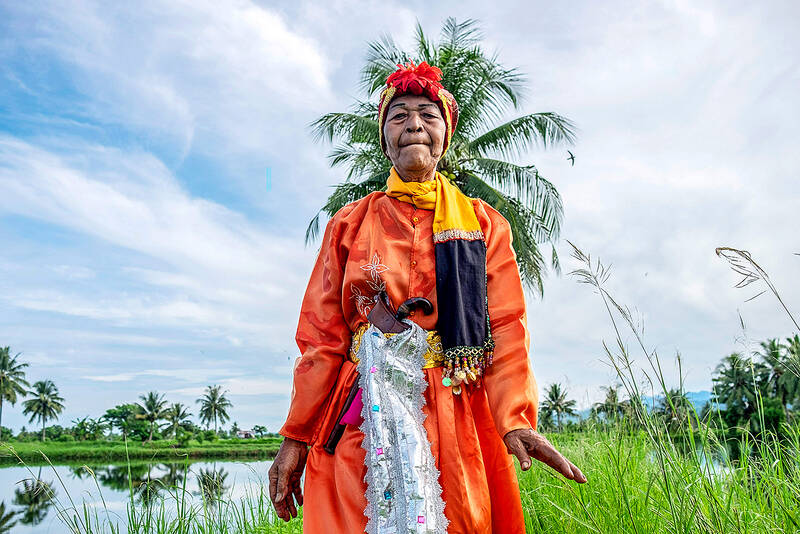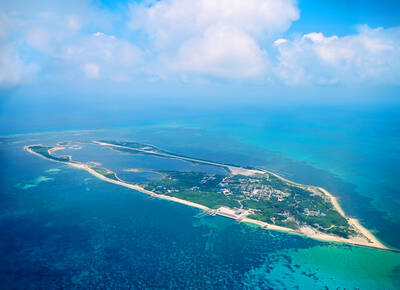After dawn in a small eastern Indonesia town, a young man holds an ornate umbrella over non-binary priest Puang Matowa Nani, as they walk barefoot to a nearby pond to perform the annual ritual of Mappalili.
The ceremony marks the start of the planting season on the island of Sulawesi, where the androgynous Bissu community to whom they belong once held divine status, but are now fighting against extinction.
Less than 40 Bissu remain in just a few areas across South Sulawesi, according to anthropologists, and they now perform cultural and shaman-like roles to prevent their traditions from dying.

Photo: AFP
Nani, a Bissu in their 60s who was born male, said they faced opposition from their family when they experienced a gender identity crisis as a child, but was now at peace with who they are.
“My family disliked it, especially my older brother,” they recalled. “He kept beating me to force me to be a real man.
“I’ve tried to change but I could not.”

Photo: AFP
In the 1950s, a rebellion led by the Islamic State of Indonesia group sought to create a caliphate in the country, leading to many Bissu being accused of violating Islamic principles and facing persecution. They were hunted, murdered or forced to behave as masculine men.
“Since then, Bissu no longer wanted to show themselves, they disappeared, and they didn’t want to do any cultural activities,” said Halilintar Lathief, an anthropologist at Makassar State University. “They were scared and decided to hide.”
The community is now on the brink of extinction, seeing their numbers dissolve into the majority Bugis ethnic group in South Sulawesi. Bugis people believe in five genders: makkunrai or cis woman; oroane or cis man; calabai or men who take on traditional roles for women; calalai or women who take on traditionally male roles; and the Bissu, who are neither male nor female but embody all genders.
Older Bissu have died and without financial or cultural support, not enough of the younger generation are replacing them. The remaining few, however, are trying to keep their heritage alive.
A ‘FLOATING SOUL’
At the pond, bordering a lush green rice field, Nani led the Mappalili ritual and chanted a prayer as other Bissu in bright silk blouses, headdresses and embroidered skirts walked behind in a parade.
The Bissu performed a dance to the beat of a drum before stabbing themselves with a slim, long dagger known as a keris, appearing as if they were in a trance.
To become a Bissu, one must receive Pammase, or a direct calling from God. You cannot join the community by marriage or birth. They must then undergo extensive training to perform different rituals and learn a secret language only Bissu can understand. Many Bissu say they receive enlightenment from God through their dreams. In one such dream, Julaeha, who goes by one name, said they were sick for two months in a delirious state in which they saw a man riding a horse telling them to join the community.
“I felt like my soul was floating,” they said.
‘MESSANGERS OF GOD’
The Bissu once lived a prosperous life. They were revered and owned lands granted by the Bugis Kingdom that preceded the modern-day Indonesian state.
“Bissu held a very important role during the kingdom era. They were considered the intermediaries between God and the people,” anthropologist Lathief said.
But now, with little money to be made, the attraction of joining the community has dwindled.
Some of the Bissu community now make a living working regular jobs such as doing bridal make-up.
“Not many are interested in becoming a Bissu because there is no salary from the government,” Nani said.
Despite the past persecution and split opinion on the community, the non-binary figures still have a place in the staunchly Islamic Bugis society.
“Since I became a Bissu, I have always been accepted by the public,” Julaeha said.
“I’ve never been insulted or ostracized. I even got called a lot to perform (rituals).”
An eager Muslim spectator at the Mappalili ceremony, Pattola Ramang, said Jakarta must do all it can to prevent the community’s extinction.
“What they do is culture and tradition which we must preserve,” the 66-year-old said. “The government should pay attention and support the Bissu so they will survive.”

Late last month Philippines Foreign Affairs Secretary Theresa Lazaro told the Philippine Senate that the nation has sufficient funds to evacuate the nearly 170,000 Filipino residents in Taiwan, 84 percent of whom are migrant workers, in the event of war. Agencies have been exploring evacuation scenarios since early this year, she said. She also observed that since the Philippines has only limited ships, the government is consulting security agencies for alternatives. Filipinos are a distant third in overall migrant worker population. Indonesia has over 248,000 workers, followed by roughly 240,000 Vietnamese. It should be noted that there are another 170,000

Enter the Dragon 13 will bring Taiwan’s first taste of Dirty Boxing Sunday at Taipei Gymnasium, one highlight of a mixed-rules card blending new formats with traditional MMA. The undercard starts at 10:30am, with the main card beginning at 4pm. Tickets are NT$1,200. Dirty Boxing is a US-born ruleset popularized by fighters Mike Perry and Jon Jones as an alternative to boxing. The format has gained traction overseas, with its inaugural championship streamed free to millions on YouTube, Facebook and Instagram. Taiwan’s version allows punches and elbows with clinch striking, but bans kicks, knees and takedowns. The rules are stricter than the

“Far from being a rock or island … it turns out that the best metaphor to describe the human body is ‘sponge.’ We’re permeable,” write Rick Smith and Bruce Lourie in their book Slow Death By Rubber Duck: The Secret Danger of Everyday Things. While the permeability of our cells is key to being alive, it also means we absorb more potentially harmful substances than we realize. Studies have found a number of chemical residues in human breast milk, urine and water systems. Many of them are endocrine disruptors, which can interfere with the body’s natural hormones. “They can mimic, block

Pratas Island, or Dongsha (東沙群島) had lain off the southern coast of China for thousands of years with no one claiming it until 1908, when a Japanese merchant set up a facility there to harvest guano. The Americans, then overlords of the Philippines, disturbed to learn of Japanese expansion so close to their colony, alerted the Manchu (Qing) government. That same year the British government asked the Manchus who owned the island, which prompted the Manchu government to make a claim, according to South China Sea expert Bill Hayton. In 1909 the government of Guangdong finally got around to sending